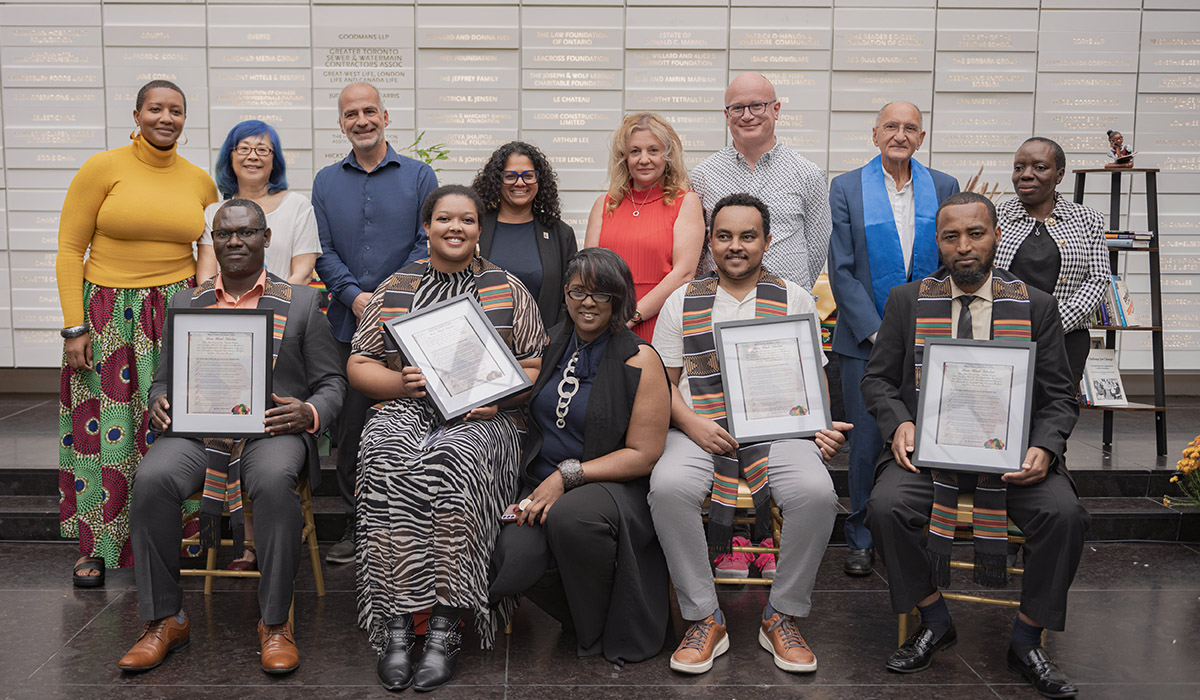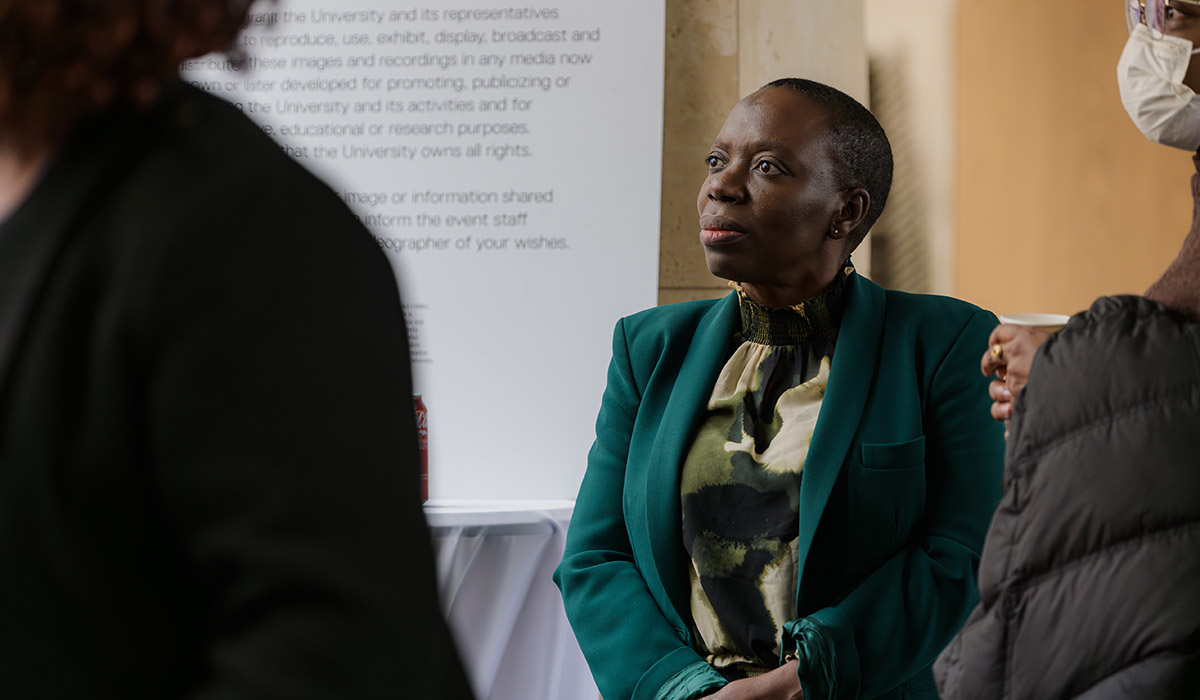Faculty recommendations
“I am so proud of the work that the Presidential Implementation Committee to Confront Anti-Black Racism has undertaken over the last three years. Our dedicated focus and the progress on the initial 14 recommendations have furthered the university’s commitment to creating a more inclusive and supportive environment for Black students, faculty and staff to prosper and flourish. Through initiatives such as the creation of a Black Scholarship Institute, deliberate actions to recruit and hire more Black faculty members and postdoctoral fellows, and by broadening our Black Studies curriculum, we are effecting long-term change for our entire community.”
- Roberta Iannacito-Provenzano, Provost and Vice-President, Academic and executive chair, Faculty Working Group

Teshager Kefale and Esa Dube Kerme at the Black Postodoctoral Fellowship Launch (Alyssa K. Faoro, 2023).
The Climate Review exposed the personal and professional experiences of anti-Black racism on many Black faculty members. They reported that consequences often include bearing additional emotional labour and scholarly demands due to chronic under-representation in areas such as curriculum development, mentorship and overall ecosystems of support. The recommendations propose adopting a holistic and cross-cutting approach to increase representation among Black faculty at all levels, establishing pathways for increased knowledge production informed by Black-, African- and Carribean-centred worldviews and mobilizing community support.

TMU should design and/or enhance programs for recruiting Black faculty members across all its programs. Cluster hires and other group-based recruitment methods should be experimented with so that new Black faculty entering the university have a community that can be clearly identified.

Student recommendation #3
Black faculty representation needs to be addressed in programs, departments, schools and faculties.

Faculty recommendation #2
Support and resources to deepen, expand and experiment with new and innovative curriculum in Black Studies in their departments, programs, and fields.

Danielle Taylor at the Alan Shepard Equity, Diversity and Inclusion Awards (Alyssa K. Faoro, 2024).
What has changed?
Following the publication of the Climate Review, the PICCABR set out to enhance and increase the production and representation of Black scholarship in pedagogy, scholarly research and creative activities, as well as through other innovative initiatives and collaborations within the university and across local and international networks and partnerships.
To achieve this, the Faculty Working Group, in collaboration with the OVPFA and OVPECI, conducted an environmental scan of existing Black studies courses at the university. Following the review, collaborations were established with the Centre for Excellence in Learning and Teaching (CELT) to expand critical anti-Black racism research and pedagogies across disciplines, and a new anti-Black racism elective course was developed. Additionally, as part of the Faculty Working Group’s collaboration with the CELT, funds for a new curriculum enhancement grant to support Black faculty have been secured and a Black Studies Guide has been developed. The guide comprises books, databases, journals, archives, periodicals, films, and carefully curated data to inform researchers on the social, economic, political and cultural histories of Black people of African descent in Canada, past and present. It provides an intentional platform to spotlight research and knowledge production by Black scholars.
The PICCABR established a goal to increase the percentage of Black faculty from three per cent to eight per cent of the total tenure-stream faculty at the institution. Recognizing the compounding barriers and intersecting opportunities to improve faculty representation, implementing partners, led by the OVPFA, employed three holistic, cross-cutting and mutually reinforcing strategies:
- broadening recruitment and marketing strategies
- strengthening pathways for prospective Black faculty
- supporting newly hired and existing Black faculty
In 2022, 21 per cent of all new full-time faculty hires at the university identified as Black, supporting a one per cent increase of Black tenure-stream faculty at TMU since the publication of the Climate Review. According to the most recent data published in the Diversity Self-ID, the highest representation of Black faculty can be observed in the Faculty of Community Services, the Creative School and the Faculty of Arts.
“Building capacities within the university is an important and effective way to help address systemic barriers experienced by Black scholars. This program will help create collegial and professional networks, thereby empowering Black scholars to foster relationships with fellow researchers and faculty, build their intellectual and research capacities and create opportunities that will impact the broader Black community.”
- Annette Bailey, co-chair of the Faculty Working Group
Broadening recruitment and marketing strategies
To reduce bias in the hiring process and intentionally attract Black faculty to positions across ranks, programs and disciplines, the Faculty Working Group introduced strategies to broaden approaches to recruitment and marketing. These strategies included incorporating OVPECI’s Diversity Self-ID tool into job applications to support a targeted increase of Black faculty, embedding language into job postings that emphasize EDI and explicitly indicating a commitment to recruiting Black faculty, expanding recruitment of Black faculty through existing networks and spaces and establishing department hiring committee equity advocates accompanied by annual training.

PICCABR executive co-chairs and chairs, Black fellows and their supervisors at the launch of the Black Postdoctoral Fellowship (Alyssa K. Faoro, 2023).
Strengthening pathways for prospective Black faculty
Recognizing that deeply entrenched global systems of inequity disproportionately exclude Black applicants from being eligible to apply for opportunities, the second approach focuses on improving pathways for Black applicants by building the capacities of prospective Black faculty in graduate and postdoctoral programs.
A postdoctoral fellowship program for Black scholars was launched to address under-representation, encouraging Black scholars to build their scholarship, research opportunities and publications through funding and support. In its inaugural year, the initiative received over 50 applications and awarded four fellowships to Black scholars.
In addition to the postdoctoral fellowship, funding was secured for the establishment of a Black Scholarship Institute (BSI). This initiative will expand Black scholarship across disciplines by mobilizing and encouraging Black-led knowledge production, documentation, publishing and intellectual dialogue, and enhanced research collaboration with communities. An Interim Director of the BSI has been hired.
Support newly hired and existing Black faculty
Finally, the third strategy aims to support newly hired and existing Black faculty to flourish and succeed in the university setting. Most notably, this strategy, led by the OVPFA with the support of the Black Faculty and Staff Community Network, leverages mentorship and other support to build a strong sense of community and a welcoming environment.

Ahmed Ahmed at the Alan Shepard Equity, Diversity and Inclusion Awards (Alyssa K. Faoro, 2024).
What is next?
With the hiring of the Interim Director, plans are now underway to establish the BSI. Situated in the Faculty of Community Services, the BSI will bring together the three Faculty Working Group approaches, providing a sustainable structure for unifying and expanding Black scholarship production and leadership across disciplines, strengthening recruitment and retention of Black scholars, supporting student mentorship in Black scholarship and building research collaboration with communities. The BSI will also seek to develop partnerships with other academic institutions on local, national and global scales and convene forums highlighting African-centred, Black-led and Black-focused research and innovations, with particular consideration for intersectionality.
In collaboration with the Faculty Working Group and the Yeates School of Graduate and Postdoctoral Studies, the Tri-Mentoring Program has introduced a Black Graduate Student Career Mentorship Program to provide mentorship opportunities, supporting Black students in graduate programs to acquire professional skills and career development opportunities.
The OVPFA is also working to build an implementation plan to support Department Hiring Committees in the appropriate and intentional use of the Diversity Self-ID to meet its recruitment, retention and promotion ambitions for Black, Indigenous and racialized communities.
Together, these next steps aspire towards a vision of TMU where Black scholars and African-centred knowledge, worldviews and wisdom are valued, embraced and celebrated as essential to academia and social change.

Annette Bailey at the Alan Shepard Equity, Diversity and Inclusion Awards (Alyssa K. Faoro, 2024).

Faculty recommendation #3
Contract lecturers, especially long-term ones, should be made aware of the differences between CUPE and the TFA. TMU should work with contract academic staff to provide them with the tools and resources to apply for tenure-track positions. This program should have clear and transparent guidelines for application.
Conversations with CUPE 3904 were initiated and will resume in the coming semesters. The Faculty Working Group remains committed to continuing to work with CUPE 3904 to identify the most appropriate next steps to address this recommendation.

Faculty recommendation #4
Contract faculty should be given a clear sense of how and why their contracts are not renewed.*
*This recommendation falls outside the purview of the PICCABR. However, Faculty Recommendation #3, which sets out to enable more opportunities for discussion among CUPE lecturers at the university, will help address this.

Essential nutrients
Essential nutrients refer to supplementary initiatives that have emerged outside of the direction of the PICCABR to cultivate the conditions for Black flourishing. While there may be some overlap, these essential nutrients have been organically planted by various students, faculty and staff groups across the university.
The Faculty of Arts is committed to continuing the decades of work that Black faculty, staff and students have done to anchor and promote Black studies. For examples of more recent initiatives, please see the (PDF file) first-term report from Melanie Knight, Advisor to the Dean of Arts on Blackness and Black Diasporic Education.
The two-year Dimensions pilot aimed to promote equitable outcomes, remove barriers to the full participation of equity-deserving groups, and create transformational change within the research cultures and ecosystems of post-secondary institutions. Supported by all three federal research granting agencies, the initiative builds on the Government of Canada’s Dimensions Charter and seeks to improve EDI in scholarly, research and creative (SRC) activities.
The Dimensions program’s objectives include:
- improving equitable access to funding opportunities
- improving research outcomes for members of equity-deserving groups
- fostering research cultures that prioritize inclusive excellence
- embedding EDI considerations into all stages of the research process
TMU was one of 17 post-secondary institutions invited to participate in the Dimensions pilot. During the two-year pilot period, TMU’s Dimensions work was led by the Dimensions team, which comprised the Dimensions director and Dimensions faculty leads (formerly Dimensions faculty chairs) representing each of the faculties and the TMU Libraries. The program falls directly under the Office of the Vice-President, Research and Innovation and the Office of the Vice-President, Equity and Community Inclusion.
During the pilot, the Dimensions team launched a series of consultation activities to help identify the EDI-in-SRC barriers experienced by community members. It facilitated structural and other kinds of change that improved research cultures and practices across the university. Responding to the SRC experiences of Black faculty, postdoctoral fellows, graduate and undergraduate students was a key priority during the pilot. Dimension's work has leveraged the Climate Review and Review of Recommendations Report to ensure alignment with university priorities and responsiveness to the expressed experiences of Black students and faculty. As such, Dimensions at TMU complements, and at times, intersects with the work being led by the PICCABR to confront anti-Black racism and promote Black flourishing at the university.
During the pilot, the Dimensions faculty leads completed several undertakings and introduced initiatives that addressed anti-Black racism in TMU’s research cultures and ecosystems.
In addition to initiatives profiled throughout this report, the following are a select few examples of many of the key efforts to confront anti-Black racism in SRC activities undertaken by the Dimensions team:
- Research and literature reviews: The Faculty of Community Services reviewed the Climate Review and similar documents from other institutions, which then became the basis for events and discussions in the faculty, particularly as regards community-engaged research. In addition to a literature review, YSGPS completed an environmental scan and review of holistic admission practices. The Faculty of Arts undertook a literature review of how community-engaged SRC activities, particularly those undertaken by Black and Indigenous faculty, are perceived, evaluated, and rewarded in academia. In 2020, the Libraries completed an equity and community inclusion environmental scan to aid the work of its strategic planning committee.
- EDI audits: Using the 2019 Student Diversity Self-ID data, the Faculty of Science graded its programs based on the representativeness of its student population against the broader community. This evaluation helped identify and address gaps and increase accountability in the recruitment of Black students across programs.
- Events, training and workshops: Dimensions hosted several town hall events in each faculty as well as in the Libraries. The Libraries’ event utilized live-action simulation to explore the EDI gaps that affect the research prospects and undertakings of early-career BIPOC librarians. The Libraries also held Black History Wikipedia events in 2021, 2022, and 2023 and produced a Black Studies LibGuide.
Additionally, the Faculty of Engineering and Architectural Science Dimensions team hosted a workshop for BIPOC students in April 2023 to raise awareness of EDI barriers and better understand the experience of Black and Indigenous students in research.
Feedback obtained from this workshop will guide future engagement with members of the faculty's Black student community and inform resource documents for faculty seeking to better support Black-identified students within their research teams. Also, the Faculty of Arts Dimensions team, in collaboration with the associate dean, Research and Graduate Studies and the Black Student Success Facilitator, held the first of a series of workshops for Black-identified graduate students in the faculty. The inaugural session allowed students to identify specific barriers they faced and receive personalized support throughout the remainder of the academic year that helped them achieve specific goals.
- Resource development: The Faculty of Sciences’ Best Practices in Equity, Diversity, Inclusion and Accessibility (EDIA) series provides resources and guidance to promote EDIA outcomes in scholarly, research and creative activities. For example, the Code of Conduct and Expectations and the Inclusive Hiring and Recruitment documents provide faculty members and research staff with knowledge to build more diverse and inclusive research teams and cultures.
- Awards and funding support: Key YSGPS initiatives in which Dimensions was involved include launching the Black Graduate Student Awards and the Postdoctoral Fellowships for Black Scholars. In The Creative School, Dimensions enhanced internal funding application processes by making the inclusion of meaningful EDI statements mandatory. In the Faculty of Arts, Dimensions collaborated with the Associate Dean, Research and Graduate Studies, to prepare EDI guidelines to support research and teaching grants.
- Communities of Practice: Dimensions supported the development of Communities of Practice within all faculties and the Libraries. These communities foster collaboration and knowledge sharing on EDI in SRC and facilitate a variety of forums that aim to create more equitable environments and outcomes for researchers.
- Monitoring, evaluation and reporting: Dimensions published reports documenting key findings, recommendations and initiatives to confront anti-Black racism and promote more equitable outcomes in scholarly, research and creative activities across faculties. Notable outputs include reports from the Faculty of Community Service, Faculty of Arts, Yeates School of Graduate and Postdoctoral Studies, Creative School Faculty, Faculty of Science, Faculty of Engineering and Architectural Sciences and Ted Rogers School of Management. Additionally, the YSGPS completed (PDF file) a report including an environmental scan and review of holistic admission review practices in 2022 and held two campus-wide events focused on holistic admissions review.
The Dimensions Program is the first of its kind in Canada. It is modelled after similar programs such as Athena SWAN in the United Kingdom and Ireland, SAGE in Australia, and SEA Change in the United States.
In March 2023, Dimensions at TMU received Stage 2 Construction Recognition from the federal government for its efforts to strategically integrate equity, diversity and inclusion within SRC cultures and ecosystems across the university and remove barriers to inclusive research, especially for members of equity-deserving groups. Dimensions at TMU is transitioning from the pilot to the construction stage. EDI priorities over the five years of the construction stage will continue to include actions to improve the SRC experience and outcomes for Black community members at TMU.
The Black Health Lead is a new role established and filled, with the support of the OVPECI, to promote Black flourishing in all facets of the School of Medicine. This inaugural role is positioned within the senior leadership team and executive committee and will provide direction from a lens to confront anti-Black racism across the new school.
The newly hired Black Health Lead will begin developing a long-term strategy, identifying the next steps to develop curriculum focused on Black health, establishing a Black learners admission stream and strengthening the relationship between the School of Medicine and Black communities and relevant, Black-focused organizations.
The Faculty of Community Services’ Anti-Black Racism Curriculum Development Fund was established in 2021 to support curriculum redesign that is more inclusive of critical Black scholarship and Black studies, drawing particularly on current Black Canadian scholarship.
The Fund supported 11 projects totalling $45,000 during its inaugural year and seven projects totalling $35,000 during its second year. These projects ranged from efforts to infuse an anti-Black racism lens into midwifery, nursing, social work and early childhood creative arts curriculum to creating digital stories on Black urbanism and planning in Canada and offering a speaker series on Black disability.
- The Faculty of Arts, Faculty of Science and TMU Libraries established communities of practice with the support of Dimensions.
- The Faculty of Community Services launched departmental and university-wide EDI committees, which have led events and school-based initiatives focused on confronting anti-Black racism.
- The Department of Architectural Science introduced an EDI Task Force to investigate anti-Black racism and barriers to inclusion.

Lia Douglas and Donna Young at TMU’s Black Excellence Graduation (2023).
Previous section:
Staff recommendations